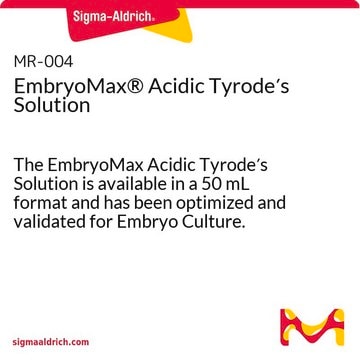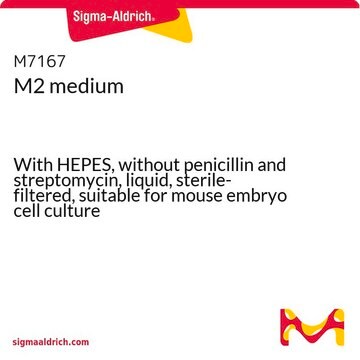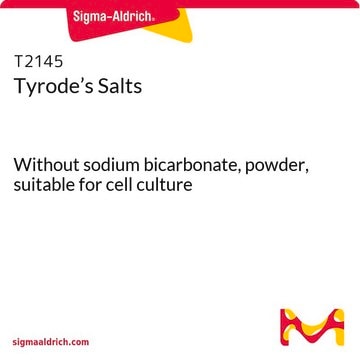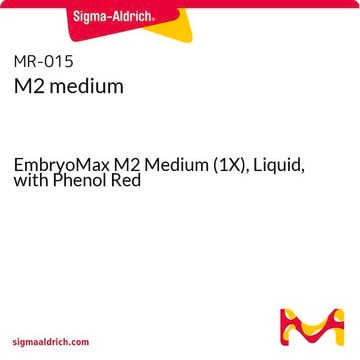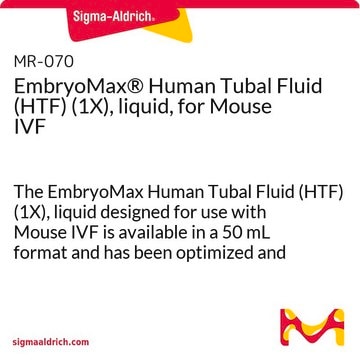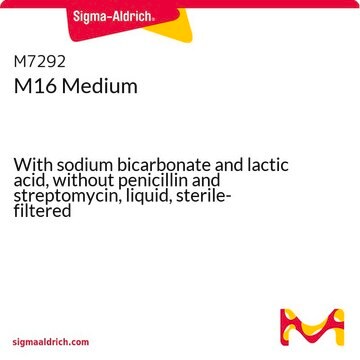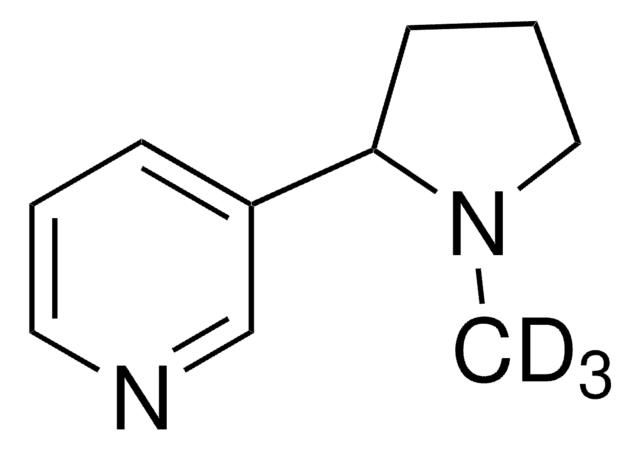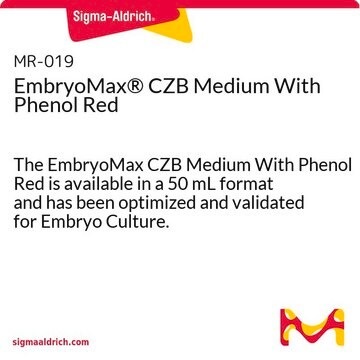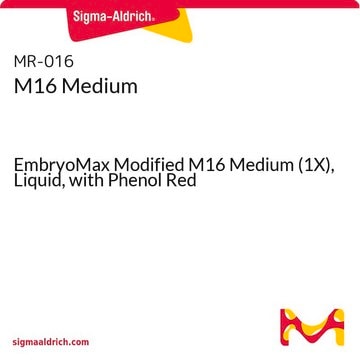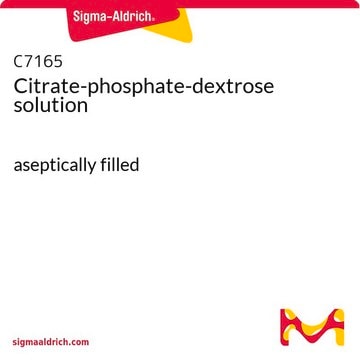T1788
Tyrode′s Solution, Acidic
liquid, sterile-filtered, suitable for mouse embryo cell culture
Synonyme(s) :
Cell culture solution
Se connecterpour consulter vos tarifs contractuels et ceux de votre entreprise/organisme
About This Item
Code UNSPSC :
12352207
Nomenclature NACRES :
NA.75
Produits recommandés
Stérilité
sterile-filtered
Niveau de qualité
Forme
liquid
Technique(s)
cell culture | embryo: suitable
Impuretés
endotoxin, tested
pH
2.5±0.3
Conditions d'expédition
dry ice
Température de stockage
−20°C
Description générale
Tyrode′s salt solution is used for diluting protein components of media of natural origin. The current role of a balanced salt solution in cell culture is multifaceted. It serves as an irrigating, transporting, and diluting agent while maintaining intra- and extracellular osmotic balance and provides cells with water and certain bulk inorganic ions essential for normal cell metabolism. It also provides the essential energy for cell metabolism and a buffering system to maintain the medium within the optimal pH range (7.2-7.6).
Application
Tyrode′s Solution, Acidic has been used for the removal of zona pellucida from oocytes/embryos.
Code de la classe de stockage
12 - Non Combustible Liquids
Classe de danger pour l'eau (WGK)
nwg
Point d'éclair (°F)
Not applicable
Point d'éclair (°C)
Not applicable
Certificats d'analyse (COA)
Recherchez un Certificats d'analyse (COA) en saisissant le numéro de lot du produit. Les numéros de lot figurent sur l'étiquette du produit après les mots "Lot" ou "Batch".
Déjà en possession de ce produit ?
Retrouvez la documentation relative aux produits que vous avez récemment achetés dans la Bibliothèque de documents.
Les clients ont également consulté
Sara Carvalhal et al.
Molecular biology of the cell, 28(19), 2470-2478 (2017-08-05)
Asymmetric cell divisions depend on the precise placement of the spindle apparatus. In mammalian oocytes, spindles assemble close to the cell's center, but chromosome segregation takes place at the cell periphery where half of the chromosomes are expelled into small
Liyan Sui et al.
Journal of cellular physiology, 235(10), 7030-7042 (2020-02-06)
Histone deacetylase 6 (HDAC6) participates in mouse oocyte maturation by deacetylating α-tubulin. However, how HDAC6 expression is regulated in oocytes remains unknown. In the present study, we discovered that mouse oocytes had a high level of HDAC6 expression and a
Zhao-Yang Xu et al.
Scientific reports, 5, 16978-16978 (2015-11-20)
Cep55 is a relatively novel member of the centrosomal protein family. Here, we show that Cep55 is expressed in mouse oocytes from the germinal vesicle (GV) to metaphase II (MII) stages. Immuostaining and confocal microscopy as well as time lapse
Guojing Chang et al.
FASEB journal : official publication of the Federation of American Societies for Experimental Biology, 31(7), 2760-2770 (2017-03-16)
During pregnancy, placental trophoblasts at the feto-maternal interface produce a broad repertoire of microRNA (miRNA) species. These species include miRNA from the primate-specific chromosome 19 miRNA cluster (C19MC), which is expressed nearly exclusively in the placenta. Trafficking of these miRNAs
Qianhua Xu et al.
Nature genetics, 51(5), 844-856 (2019-05-02)
The oocyte epigenome plays critical roles in mammalian gametogenesis and embryogenesis. Yet, how it is established remains elusive. Here, we report that histone-lysine N-methyltransferase SETD2, an H3K36me3 methyltransferase, is a crucial regulator of the mouse oocyte epigenome. Deficiency in Setd2
Notre équipe de scientifiques dispose d'une expérience dans tous les secteurs de la recherche, notamment en sciences de la vie, science des matériaux, synthèse chimique, chromatographie, analyse et dans de nombreux autres domaines..
Contacter notre Service technique
